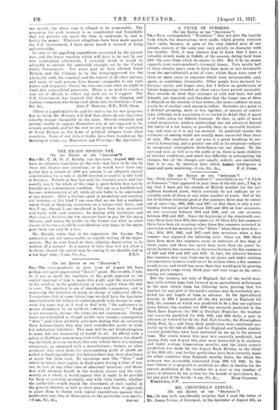A CYCLE OF SUMMERS.
(To roe EDITOR or THE " Seecraroa."1 SIN,—Your correspondent " Wanderer " does not give the locality from which his observations were made, which greatly restricts their value, because, in spite of the very limited area of our islands, seasons of the same year vary greatly in character with the locality. Still, it may interest him to know that I have a valuable record, made in Suffolk, of the seasons, dating back from 1881—the year from which he starts—to 1811. But it by no means supports your correspondent's triennial theory. Very nearly half of these seventy years seem to have been more or less favourable from the agriculturist's point of view, whilst there were eases of three or more years in sequence which were unfavourable, and. again, as sometimes, favourable. Other people have declared for five-year cycles, and longer ones, bat I believe no predictions of future happenings founded on these views have proved successful. Past records do show that extremes of cold and heat, wet and drought, are repeated, and therefore that the longer one of them is delayed, as the severity of last winter, the more confident we may yearly be of another such season to follow. Statistics also point to a distinct grouping, more or less together, of seasons of similar type, although each association is so varied in detail that it again is of little value for definite forecast. So that, in spite of much sound progression, modern meteorology has not advanced beyond the limits of a few hours, or possibly days, in successful forecast- ing, and even no it is not too assured. In predicted storms the estimates of coming winds are usually more successful than those of rain. The smallness of our area is a great handicap to suc- cessful forecasting, and a greater one still is its situation—subject to exceptional atmospheric disturbance—on our planet. To the east and west, as well as to the south of us, there is mare stability of weather conditions, and much less difficulty in anticipating the changes, but all the changes are equally orderly, are controlled, that is to say, by identical laws which human intelligence is
more and more mastering—I em, Sir, &a., F. J. Comm.


























 Previous page
Previous page